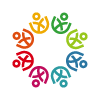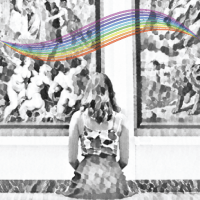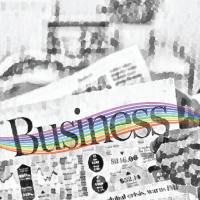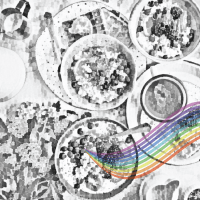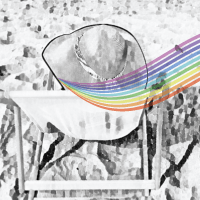- Atilla Tiriyaki
- Average Reading Time: 8 minutes
- Community, Statistics
- articles, atillat
To go back to the term’s true meaning, let us start by looking at the textbook definition. Equality means the state of being equal, especially in status, rights or opportunities. Equality does not mean taking power from one group and giving it to another; it merely implies that everyone should be treated the same. For example, if 15 people attended an interview and the most experienced and qualified person got the job, that would be a fair process. Individuals hired purely because of who they know, due to the social-economic group they belong to or because of the colour of their skin, then that creates inequality.
Another example is the age of consent. In many countries, the age at which a person can legally consent to and have sex is the same for men and women, regardless of sexual orientation. However, in some countries, the age of consent is different for those consenting to heterosexual or homosexual relations. For example, in certain countries, the difference between the consents can be two or even four years. These differences create inequalities because it would be a fairer system if everyone had legal consent at the same age. So, equality is simply treating everyone the same, good or bad, especially regarding the laws, rules and protection within any given country.
Many countries and regimes still defending and enforcing these antiquated laws are typically old-fashioned monarchies, dictatorships, oligarchies or juntas. Though expected with some well-known regimes, it is surprising to learn the number of democratic countries where prejudice and discriminatory laws still exist. For democracies, officials and governments are typically elected and appointed by that country’s people. The government is meant to represent, protect and ensure the well-being of all those that live within that country. Some may still have large groups of individuals that follow a particular faith or religion. However, the main principle for most modern nations is that the state and religion are meant to be separate.
Appointed representatives of districts, states, and provinces are elected to represent the rights and well-being of all those that live in their constituency. The representative’s personal views, beliefs and even their agendas should be secondary to the will of the people that they represent. The moment a government singles out and targets groups, they no longer serve all within that country. Especially when quoting laws written centuries ago or even scriptures to validate a point does not justify persecution. It is giving those carrying out these often-abhorrent acts a way of denying any responsibility and accountability
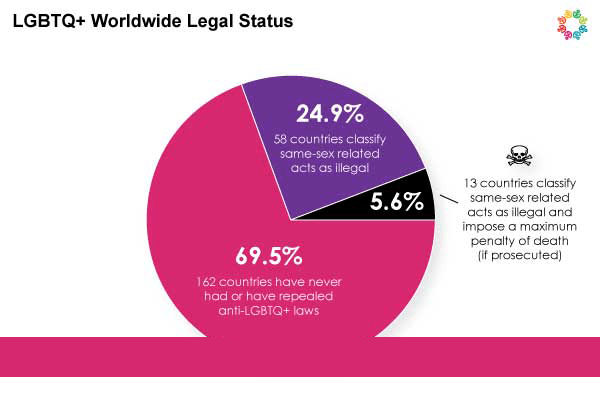
LEGAL STATUS
In 2019, three countries, Angola, Botswana and Bhutan, decriminalised same-sex activities. All of which takes the total number of countries never to have had or those that repealed anti-LGBTQ+ sexuality laws to 162 out of 233 or 70% worldwide. Gabon in Central Africa was the only country in 2019 to adopt a ban on homosexuality, joining 71 other countries that still have laws criminalising same-sex activities.
16 out of 71 or 7% of all countries still have laws that criminalise same-sex relationships but do not prosecute those breaching the law. Though they might repeal those laws in the future, in 2020, they still have laws criminalising same-sex relationships. Compared against the other end of the scale, 13 or 6% of countries still enforced a death sentence for same-sex prosecutions. 52 out of 71 or 22% of all countries worldwide still actively enforce some form of penalty. Countries like Uganda and Brunei were looking to adopt harsher punishments for convicted same-sex activities. However, the proposed bills were suspended or put on hold due to public and international pressure.
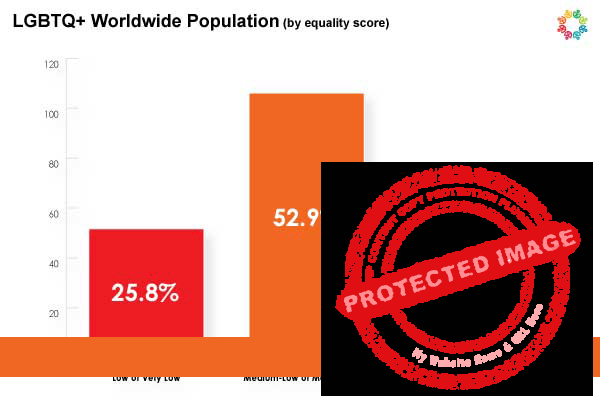
PEOPLE
There are no official censuses or statistics concerning the world’s LGBTQ+ population; however, it is estimated that 2.6393% of the world’s population identify as LGBTQ+. The estimates are conservative, and the actual number will likely be a lot higher. Using the current estimates, that would mean that in 2019, 200.8 million LGBTQ+ individuals were living around the world. Of those individuals:
- 118.8 million or 59.2% of the population, live in Asia
- 34.5 million or 17.2% of the population, live in Africa
- 26.6 million or 13.3% of the population, live in the Americas
- 19.8 million or 9.8% of the population, live in Europe
- 1.1 million of 0.5% of the population live in Oceania
It is estimated that 51.7 million or 25.8% of LGBTQ+ individuals live in countries where equality is low or very low. 106.2 million or 52.9% live in countries where the equality status is categorised as medium-high or medium-low. Lastly, 42.8 million or 21.3%, live in countries where equality is high or very high.
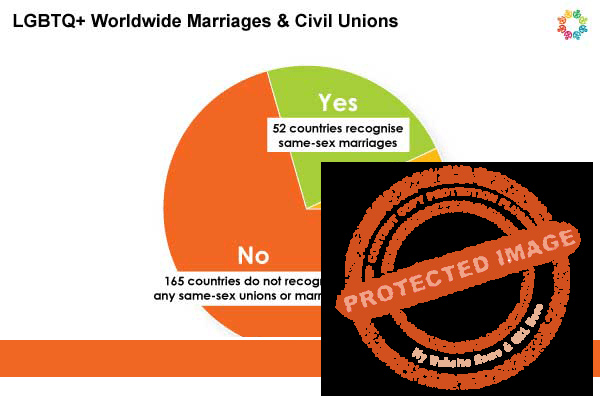
UNIONS AND MARRIAGE
In 2019, Austria, Taiwan and Ecuador legalised same-sex marriages, taking the total number of countries to 52 or 22.3%. 68 or 29.2% of countries worldwide recognise some form of same-sex union or partnership, with 70.8% or 165 countries that do not legally recognise same-sex marriages or unions. In terms of the global LGBTQ+ population, that means:
- 44.8 million individuals were able to form a lawfully recognised marriage
- 58.6 million individuals were able to create a legally recognised civil union or partnership
- 142.2 million individuals were unable to form any recognised union, partnership or marriage legally
Also, in 2019, many Methodist, Evangelical, Lutheran and National Churches are now recognising blessings of same-sex marriages, a significant development regarding faith and the LGBTQ+ community.
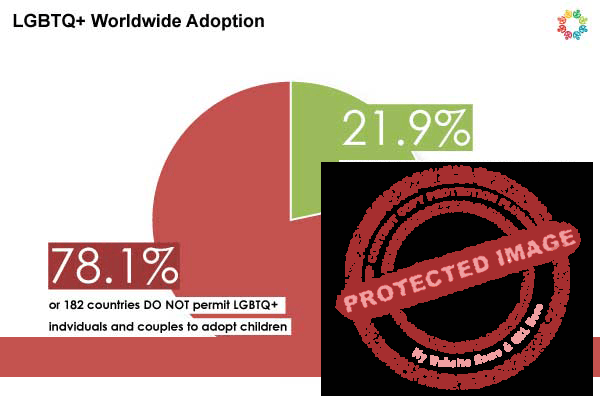
51 or 21.9% of countries worldwide allow LGBTQ+ individuals and couples to adopt children. In terms of continents, the highest number of countries that permits LGBTQ+ individuals or couples to adopt children is Europe at 20 or 8.6% of countries. The Americas follow them at 18 or 7.7% of countries. The lowest number is in Asia at 1 or 0.4% of counties, followed by Africa at 4 or 1.7% of countries. Of the 182 or 78.1% of countries that do not permit LGBTQ+ individuals or couples to adopt, it is also not illegal to practice same-sex related acts within 111 or 61% of countries. In comparison, 71 or 39% of countries classify same-sex-related acts as unlawful.
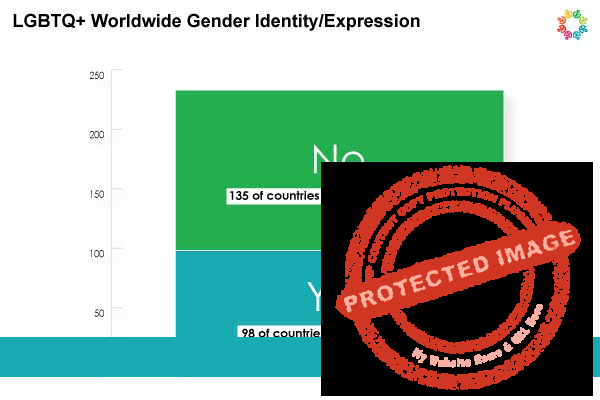
The laws concerning gender identity or expression usually relate to whether individuals can legally change their identity on official documentation. Countries with laws in place may impose conditions for individuals when they change their official documents to reflect their true identity. Some nations have specific requirements, such as evidence that surgical or medical treatments have taken place, including chemical castrations. In terms of laws concerning gender identity/expression:
- 98 or 42.1% of countries have some laws in place
- 135 or 57.9% of countries have no laws in place
Europe has the most significant number of countries with gender identity or expression laws at 40 or 17.2%, Asia with 25 or 10.7%, and the Americas with 20 or 8.6%. A positive development occurred in 2019 concerning gender expression when Germany introduced a law allowing the third gender option (“diverse”) on official documents.
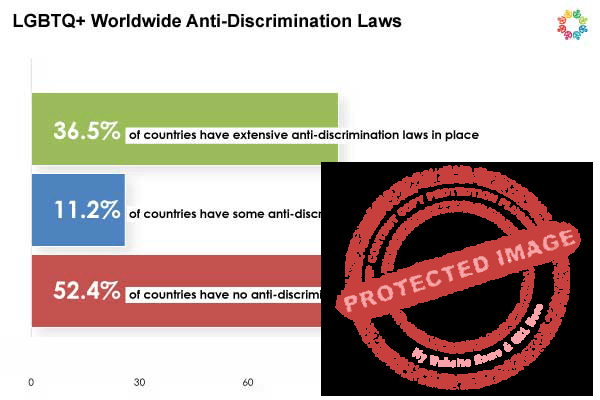
In 2019, Sweden introduced a new law banning hate speech based on ‘transgender identity or expression’. San Marino introduced laws forbidding discrimination based on sexual orientation within the constitution. 85 or 36.5% of countries worldwide have in place anti-discrimination laws that are considered extensive, and 26 or 11.2% have some anti-discrimination laws in place. Over half of the world’s countries, 122 out of 233 or 52.4%, have little or no anti-discrimination laws in place.
Equality is simply about everyone being treated the same. Ensuring everyone has the same rights as everyone else in that society. The overall objective is that people globally love whoever they wish to love, regardless of gender, race, or beliefs. For us all to choose and have the ability to have the life goals of marrying and starting a family. Finally, that official documentation reflects who we are, not just the gender or name we were assigned at birth.
None of these requests is a huge ask, even outside the realms of reality or possibility. When we treat everyone as equal, we live in a fair, happier and balanced society.
Interactive Worldwide Equality Index
More from Gayther
Discover all of the exciting and entertaining articles written by people from the worldwide LGBTQIA+ community, sharing their stories, opinions and experiences in their own style and from their unique perspectives

